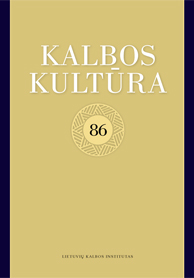BENDRINĖ LIETUVIŲ KALBA EUROPOS KALBŲ POSTANDARTIZACIJOS KONTEKSTE
STANDARD LITHUANIAN IN THE CONTEXT OF POST-STANDARDIZATION OF EUROPEAN LANGUAGES
Author(s): Rita MiliūnaitėSubject(s): Comparative Linguistics, Sociolinguistics, Baltic Languages
Published by: Lietuvių Kalbos Institutas
Keywords: standard language; standardization; posttandardization; destandardization; demotisation; sociolinguistics; language ideologies;
Summary/Abstract: During the past few decades, the European languages and their standard varieties have experienced significant changes. The reasons of these changes (due to the political, social, economic, cultural development of European countries) are common: globalization, democratization and internetization, as well as different intensity and directions of migration. Unsurprisingly, researchers of the European languages show considerable interest in the development of standard languages and changes in their relationship with non-standard varieties. There are a lot of theoretical and empirical studies of the convergence processes of these varieties. Standard language is usually defined by the following attributes: commonality to society as a whole, homogeneity of norms, stable codification and prestige. Thus the scope of issues related to the dynamics of standard languages is broad: 1) changing relation with other varieties of the national language, 2) increasing or decreasing variability of public usage (especially mass-media), 3) changing the nature of the codification of standard language norms, 4) changing the ideology and prestige of the standard language, 5) relation between changes in usage and language ideologies. The European standard languages are experiencing two-fold (structural and ideological) changes in different degree. In the level of usage variability and colloquialization increases, in the level of language ideology prestige of the standard language weakens or a new standard forms. According to these changes various models of the post-standardization period of standard languages are being developed, such as destandardisation, demotization, restandardisation, ect. At the same time, it should be taken into account the fact that “specific nature of these language dynamics differs from nation to nation, dependent on the (historical) context” (Ghyselen et al. 2016).
Journal: Bendrinė kalba (iki 2014 metų – Kalbos kultūra)
- Issue Year: 2019
- Issue No: 92
- Page Range: 1-29
- Page Count: 29
- Language: Lithuanian

